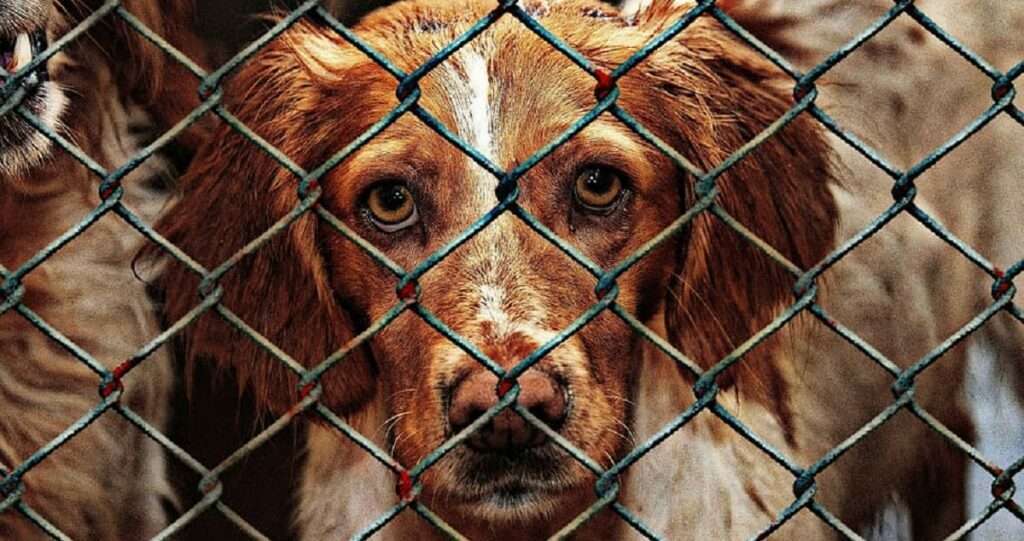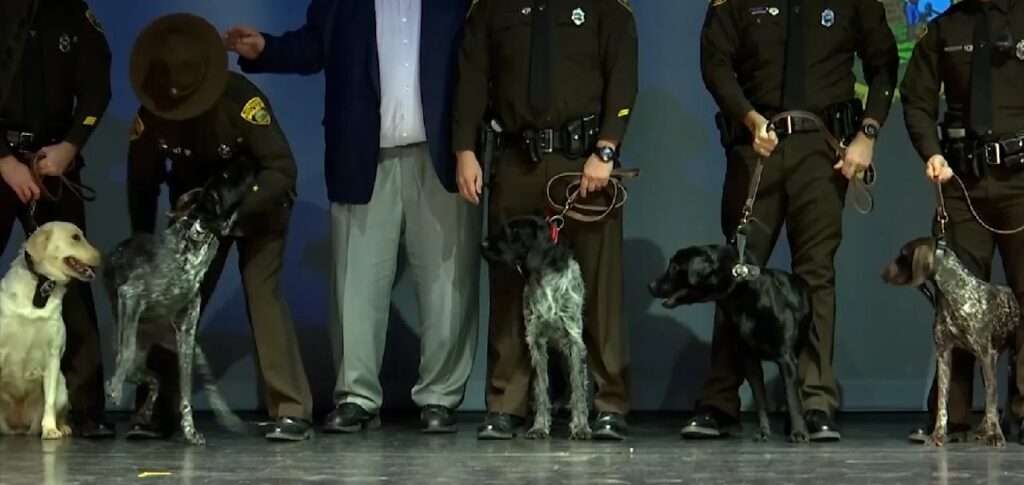Like many other states in the United States, West Virginia has a set of laws and regulations specifically governing dogs’ ownership, care, and control. These laws are designed to assure the safety of both dogs and the community and establish guidelines for responsible dog ownership.
The West Virginia dog laws cover various aspects, including dog licensing, dangerous dogs, animal cruelty, and leash requirements.
Defining a Dangerous Dog

In West Virginia, a “dangerous dog” is defined as threatening the safety of humans, other animals, or property due to its aggressive behavior or history of actions. The classification of a dog as “dangerous” is determined based on specific criteria outlined in the state’s dog laws.
These criteria typically include behavioral factors, incidents of aggression, and the severity of any past attacks. Classifying a dog as dangerous often leads to additional regulations and requirements imposed on the owner to ensure public safety.
Dangerous Dog: Key Factors

- Aggressive Behavior: A dog’s aggressive behavior is a primary factor in determining its classification as dangerous. This behavior can encompass unprovoked attacks, biting, lunging, or actions that intend to harm humans, animals, or property.
- Serious Injury or Death: If a dog has caused serious injury or death to a person or another animal, it is likely to be classified as dangerous. The severity of the outcome is considered when assessing the danger posed by the dog.
- Multiple Incidents: A history of multiple aggressive incidents, even if they haven’t resulted in serious injury, can contribute to a dog being labeled dangerous. The pattern of behavior is taken into account when evaluating the potential threat.
- Threat to Public Safety: Dogs that exhibit behavior suggesting a threat to public safety, such as aggressive behavior in public spaces, can also be classified as dangerous. This helps authorities intervene before an incident occurs.
Does West Virginia Ban Certain Types of Dogs?
West Virginia does not have a statewide ban on specific dog breed. However, some local jurisdictions within the state might have implemented breed-specific legislation (BSL) or restrictions targeting certain types of dogs perceived as dangerous. These regulations are often aimed at breeds commonly associated with aggression, such as pit bull terriers, Rottweilers, and others.

Breed-specific legislation typically includes regulations that impose stricter requirements on owners of these specific breeds. These requirements might include:
- Mandatory Muzzling: Dogs of certain breeds might be required to wear muzzles in public spaces to prevent potential incidents.
- Liability Insurance: Owners might be obligated to carry liability insurance that covers injuries or damages caused by their dogs.
- Confinement: Some areas might mandate that dogs of specific breeds be securely confined within a fenced yard or other appropriate enclosure.
- Registration and Identification: Owners might need to register their dogs with local authorities, providing information about the dog’s breed, age, and other relevant details.
It’s important to note that breed-specific legislation is a contentious issue, as it targets breeds rather than individual dog behavior. Critics argue that a dog’s behavior is more related to training, socialization, and individual temperament than its breed.
On the other hand, supporters of breed-specific legislation often believe that it helps prevent potential dangers associated with certain breeds.
Pet Owner Has a Restricted Dog Breed
West Virginia has no statewide ban on specific dog breeds. However, some local jurisdictions within the state might implement breed-specific legislation (BSL) or restrictions targeting certain types of dogs perceived as dangerous. If you are a pet owner with a restricted dog breed in West Virginia, you must be aware of any local regulations that might apply to you and your dog.

If you own a dog breed that is restricted or considered potentially dangerous in your specific area, here are some key considerations:
- Research Local Regulations: Check with your local animal control, city, or county authorities to determine whether breed-specific restrictions exist. These regulations include requirements for muzzling, insurance, confinement, and more.
- Compliance: It must comply fully if specific regulations exist for owning a restricted dog breed. This might include adhering to leash and muzzle requirements, obtaining the necessary insurance, and following confinement guidelines.
- Responsible Ownership: Dog ownership is crucial regardless of breed-specific regulations. This includes proper socialization, training, and a safe environment for your dog and the community.
- Behavior Management: If you own a breed that might be subject to restrictions due to its perceived potential for aggression, it’s even more important to ensure that your dog’s behavior is well-managed. Proper training & socialization can go a long way in preventing incidents.
- Liability Insurance: Some areas require owners of restricted breeds to carry liability insurance that covers potential injuries or damages caused by their dogs. Inquire about this requirement and obtain the appropriate insurance coverage if needed.
- Stay Informed: Keep yourself updated about changes in local regulations or laws related to restricted dog breeds. Regulations can evolve, and staying informed will help you remain compliant.
Remember that public opinion on breed-specific legislation can vary, and discussions around the effectiveness and fairness of such regulations continue. It’s essential to advocate for responsible pet ownership and work towards preventing incidents, regardless of breed.
Other Dog Laws in West Virginia
In addition to regulations related to dangerous dogs and potentially restricted breeds. West Virginia has several other dog-related laws to promote responsible ownership, ensure public safety, and protect the well-being of dogs and the community.

These laws cover various aspects of dog ownership, including licensing, cruelty prevention, leash requirements, and more. Here are some notable dog laws in West Virginia:
“West Virginia Dog Owner’s Guide: From Leashes to Love 🐾
🐶 License to Wag: Keep your pup legal! Obtain a pet license with vaccinations to keep them safe and identifiable.
🦴 Leash the Excitement: Leash laws for pawsome outings! Ensure a safe and friendly environment by restraining your furry friend in public spaces.
📢 Shush the Bark: Happy barks, peaceful hoods! Address excessive barking with training to keep the harmony intact.
⚠️ Handle with Care: “Dangerous Dog” Alert! Safety first! Learn about designations and precautions to prevent incidents and ensure a secure community.
🚫 Cruelty-Free Zone: Love and care for all! West Virginia’s strong laws against animal cruelty promote responsible pet ownership.
🐾 Inclusion Matters: Service animals for all abilities! Recognizing the importance of inclusion and equal opportunities with service animals.
💔 Liability and Love: Love responsibly! Understand dog bite liability and practice preventive measures.
🔗 Tether with Care: If you tether, do it right! Check regulations to keep your furry companion safe and happy.
🤫 Nuisance-Free Zone: Peaceful neighborhoods paw-sible! Keep barking under control to maintain good relations with your neighbors.
💉 Rabies Ready: Protect your pup and others! Ensure rabies vaccinations are up-to-date.
🔍 Lost & Found Mission: Be a hero for lost dogs! Know your responsibilities when you find a lost furry friend.
Types of Dog Vaccines: By West Virginia Dog Laws

Like many U.S. states, West Virginia requires certain dog vaccinations to help prevent the spread of diseases and ensure public health and safety. The specific vaccines required by law can vary by state, and local ordinances might also play a role in determining the mandatory vaccinations.
Below are the common types of dog vaccines that are often required by law or strongly recommended in West Virginia dog laws:
1. Rabies Vaccine
The rabies vaccine is one of the most crucial and commonly mandated vaccines for dogs. Rabies is a toxic viral disease that can be transmitted to humans & other animals through the bite of an infected animal. In West Virginia dog laws, dogs must be vaccinated against rabies by a certain age, often around 4 to 6 months, and then receive booster shots as recommended by the vaccine manufacturer or local regulations.
2. Canine Distemper Vaccine
The canine distemper vaccine protects against a highly contagious & potentially fatal viral disease that affects a dog’s respiratory, gastrointestinal, and nervous systems. Puppies are usually given a series of distemper shots starting at around 6 to 8 weeks of age, with boosters administered every few weeks until they are around 16 to 18 weeks old.
3. Canine Parvovirus Vaccine
Canine parvovirus is a highly contagious virus primarily affecting puppies and unvaccinated dogs. The parvovirus vaccine is essential to a dog’s vaccination schedule, starting at a young age and requiring multiple boosters to establish proper immunity.
Canine Adenovirus Type 2 Vaccine:
The adenovirus type 2 vaccine helps protect against infectious canine hepatitis & respiratory disease caused by adenovirus. This vaccine is commonly included in combination vaccines, which offer protection against multiple diseases in a single shot.

1. Bordetella Vaccine (Kennel Cough)
While not always required by law, the Bordetella vaccine is often recommended, especially for dogs frequently in close contact with other dogs, such as those visiting dog parks, boarding facilities, or grooming salons. Bordetella, known as kennel cough, is a highly contagious respiratory infection among dogs.
2. Dog Bite in West Virginia Dog Laws
In West Virginia, dog bite cases are generally governed by statutes and common law principles. West Virginia follows what is known as a “one bite rule” or “negligence rule” when it comes to dog bite liability. This means that the owner of a dog may be held liable for injuries caused by the dog if they were aware of the dog’s dangerous tendencies or prior incidents of aggression.
Under the one-bite rule, a pup owner may be held liable for injury caused by their dog if the dog has a known history of aggressive behavior or previous attacks and the owner was attentive to the dog’s aggressive tendencies before the incident occurred.
In other words, if the owner knew or had reason to know that their dog had a propensity to bite or act aggressively, they could be held responsible for any injuries caused by the dog.
However, it’s important to note that West Virginia also has a statute that can hold a pup owner liable for injuries caused by their dog, regardless of the dog’s prior behavior. This statute is known as the “strict liability” for dog bites.
According to West Virginia Legislature (gov), §19-20-20. Keeping vicious dogs; humane officers may kill such dogs. Except as provided in section twenty-one of this article, no person shall own, keep or harbor any dog known by him to be vicious, dangerous, or in the habit of biting or attacking other persons, whether or not such dog wears a tag or muzzle.
According to this law (WV Code § 19-20-13), a canine owner can be held responsible for injuries caused by their pup if the victim was not trespassing or provoking the dog and the victim was legally permitted to be where the attack occurred.
In cases where strict liability applies, the victim does not need to prove that the dog had a history of aggression or that the owner was aware of such behavior. Instead, the focus is on the circumstances of the incident and whether the victim was lawfully present.
West Virginia Dog Laws Abandonment
Like many other states, West Virginia has laws to address animal cruelty and abandonment. Abandoning animals, including dogs, is generally considered animal cruelty. These laws aim to protect the well-being and welfare of animals and prevent acts that could cause them unnecessary suffering.

In West Virginia dog laws, animal cruelty & abandonment laws are typically covered under the West Virginia Code, primarily in Chapter 61. This chapter outlines various provisions related to the treatment of animals, including penalties for cruelty, abandonment, neglect, and other forms of mistreatment. The exact details of these laws, including potential penalties, can vary based on the circumstances and severity of the offense.
Dog abandonment laws may encompass various actions or behaviors, such as leaving a dog in unsafe conditions without adequate food, water, shelter, or medical care. Penalties for violating these laws could include fines, community service, probation, or even confinement, depending on the severity of the offense & the state’s legal framework.
In many jurisdictions, reporting animal cruelty or abandonment is encouraged and often provided for through a designated local animal control agency or a humane society. These organizations work to investigate reports of abuse or neglect & take appropriate action to ensure the animals’ welfare.
West Virginia Dog Laws Chain

West Virginia dog laws had regulations regarding the tethering or chaining of dogs. These regulations aimed to ensure the safety and welfare of dogs while preventing them from being kept in inhumane or dangerous conditions. Some key points about West Virginia’s dog chaining laws were:
- Length and Type of Chain: The chain or rope used to secure a dog must be appropriate to allow the dog to move around comfortably and access essential resources like food, water, and shelter. Chains that were too short to allow proper movement were typically prohibited.
- Access to Basic Needs: Tethered dogs must access adequate food, clean water, and appropriate shelter.
- No Chaining in Extreme Weather: Dogs cannot be chained outside during extreme weather conditions, such as when the temperature is extremely hot or cold. This is to prevent them from suffering due to exposure to harsh conditions.
- No Chaining for Extended Periods: Continuous chaining for excessively long periods was typically not allowed. Dogs require social interaction and exercise, and prolonged chaining can lead to physical and psychological problems.
- Collar Safety: The collar used on a tethered dog should be properly fitted and safe. It should not cause injury or discomfort to the dog.
- No Use of Heavy Chains or Improper Restraints: The use of heavy chains that could cause harm to the dog or improper restraints that could lead to injury was generally prohibited.
- Breed-Specific Regulations: Some local ordinances in West Virginia might have specific regulations related to certain breeds, especially those considered dangerous. These regulations could include additional restrictions on chaining or tethering.
West Virginia Dog Cruelty Laws
West Virginia dog laws prevent animal cruelty, including cruelty to dogs. These laws aim to ensure the well-being and humane treatment of animals. Please remember that laws can change, so verifying this information with up-to-date legal resources or authorities is crucial. Here’s a general overview of West Virginia’s dog cruelty laws:

- Prohibition of Cruelty: West Virginia dog law prohibits the intentional or negligent mistreatment, abuse, or cruelty to animals, including dogs. This can encompass many actions, such as physical abuse, neglect, abandonment, and failure to provide adequate care.
- Basic Needs: Dog owners must provide their dogs with necessities, including proper food, clean water, shelter, and veterinary care when needed. Failing to provide these essentials can be considered animal cruelty.
- No Tethering or Chaining in Cruel Conditions: The state typically has regulations about tethering or chaining dogs that lead to suffering, injury, or distress. This includes situations where the dog is left in extreme weather conditions or without access to food, water, and shelter.
- Humane Euthanasia: If euthanasia is necessary, it must be done humanely and by accepted standards. Inhumane methods of euthanasia are prohibited.
- Fighting and Baiting: Organizing, participating in, or promoting dog fights, as well as using dogs as bait for training purposes, is illegal and considered animal cruelty.
- Physical Abuse: Physically harming a dog through beating, kicking, or other violent actions is prohibited.
- Veterinary Care: Dogs requiring medical attention must receive proper veterinary care. Neglecting or intentionally withholding medical treatment from a needy dog is considered cruelty.
- Animal Hoarding: Accumulating many dogs or animals without providing adequate care and living conditions can be animal cruelty.
West Virginia Dog Laws Rank Against Other States

West Virginia dog laws are typically regulated under the West Virginia Code, particularly within Chapter 19 (Agriculture) and Chapter 61 (Crimes and Punishments). These laws cover various dog-related topics, including licensing, registration, cruelty prevention, dangerous dog designations, and leash laws. It’s important to note that the specific content and ranking of West Virginia’s dog laws could change over time due to legislative updates or revisions.
To get the most accurate and up-to-date ranking of West Virginia’s dog laws against those of other states, I recommend checking with legal databases, animal welfare organizations, or government websites that provide comprehensive information about state-specific laws.
Remember that laws can change over time, so accessing the most current information is important.
How Many Dogs Can You Have in West Virginia Dog Laws?

In West Virginia, the number of dogs you can have is generally not regulated by a specific statewide law. However, local ordinances and regulations set by municipalities and counties might dictate limits on the number of dogs you can own. These rules can vary generally depending on the area.
It’s important to check with your local government or animal control agency to determine if there are any restrictions on the number of dogs you can have in your specific location within West Virginia. Always prioritize the well-being and care of your dogs, ensuring that you can provide them with appropriate attention, space, and care regardless of any numerical limits set by local regulations.
Conclusion
Responsible dog ownership is necessary for safety and harmony in West Virginia dog Laws. Leash laws, vaccination mandates, and licensing regulations guide us toward a furry-friendly future. Embracing these rules ensures a joyful environment for humans and their four-legged friends to thrive together. Following these laws isn’t just a requirement – it’s a way to keep tails wagging and smiles shining in the Mountain State.
Understanding and adhering to dog laws is essential for maintaining a harmonious coexistence between pets and people, creating a safer and more compassionate society. Stay informed and prioritize your furry companion’s well-being as you navigate the world of dog ownership in West Virginia.
